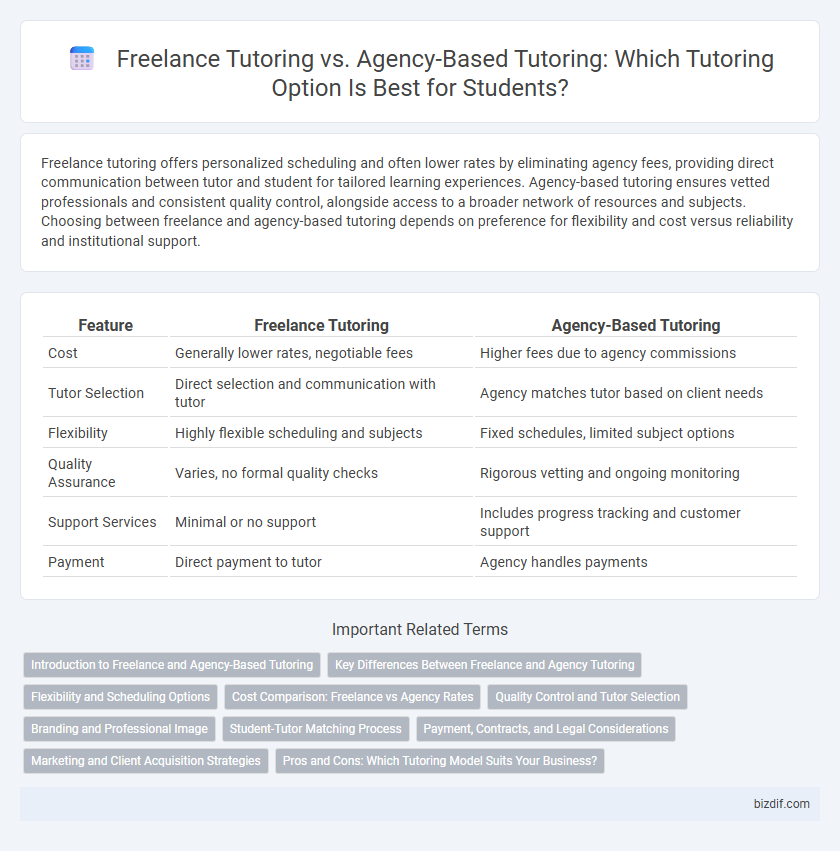Freelance tutoring offers personalized scheduling and often lower rates by eliminating agency fees, providing direct communication between tutor and student for tailored learning experiences. Agency-based tutoring ensures vetted professionals and consistent quality control, alongside access to a broader network of resources and subjects. Choosing between freelance and agency-based tutoring depends on preference for flexibility and cost versus reliability and institutional support.
Table of Comparison
| Feature | Freelance Tutoring | Agency-Based Tutoring |
|---|---|---|
| Cost | Generally lower rates, negotiable fees | Higher fees due to agency commissions |
| Tutor Selection | Direct selection and communication with tutor | Agency matches tutor based on client needs |
| Flexibility | Highly flexible scheduling and subjects | Fixed schedules, limited subject options |
| Quality Assurance | Varies, no formal quality checks | Rigorous vetting and ongoing monitoring |
| Support Services | Minimal or no support | Includes progress tracking and customer support |
| Payment | Direct payment to tutor | Agency handles payments |
Introduction to Freelance and Agency-Based Tutoring
Freelance tutoring offers personalized one-on-one sessions directly arranged between tutor and student, often allowing for flexible scheduling and customized lesson plans. Agency-based tutoring involves working through a structured organization that handles client acquisition, scheduling, and billing, providing tutors with a steady stream of students and administrative support. Understanding the benefits and limitations of each model helps tutors select the best approach for their teaching style and career goals.
Key Differences Between Freelance and Agency Tutoring
Freelance tutoring offers personalized learning experiences with flexible scheduling and direct communication between tutor and student, allowing tailored lesson plans. Agency-based tutoring provides structured support, vetted tutors, and a broader range of resources, often ensuring consistent quality and accountability. Pricing models differ, with freelance tutors setting individual rates while agencies may offer standardized packages or subscription plans.
Flexibility and Scheduling Options
Freelance tutoring offers unparalleled flexibility, allowing tutors and students to customize sessions based on personal schedules and learning pace, often accommodating last-minute changes. Agency-based tutoring typically follows structured timetables and standardized booking systems, which may limit spontaneous scheduling but ensures consistent availability and professional oversight. Choosing between the two depends on whether personalized time management or reliable, pre-set appointments better suit the learner's needs.
Cost Comparison: Freelance vs Agency Rates
Freelance tutoring rates typically range from $20 to $60 per hour, offering flexible pricing tailored to individual tutors' qualifications and experience. Agency-based tutoring often charges higher fees, between $40 and $100 per hour, due to additional administrative costs and quality assurance services. Choosing freelance tutoring can be more budget-friendly, while agency tutoring provides structured support and vetted professionals.
Quality Control and Tutor Selection
Freelance tutoring offers personalized tutor selection and direct communication, allowing for tailored quality control based on individual preferences and feedback. Agency-based tutoring ensures rigorous vetting processes, standardized training, and continuous performance monitoring to maintain consistent quality across tutors. Clients seeking reliable and verified expertise often prefer agency-based services, while those valuing flexibility and direct oversight may opt for freelance options.
Branding and Professional Image
Freelance tutoring allows tutors to build a highly personalized brand, showcasing unique teaching styles and expertise directly to clients, enhancing trust and individual recognition. Agency-based tutoring benefits from established brand reputation and professional marketing, providing tutors with a credible image and access to a broader client base. Strong branding in freelance tutoring demands consistent online presence, client testimonials, and tailored communication, while agency tutors leverage the agency's professional image for instant credibility.
Student-Tutor Matching Process
Freelance tutoring offers personalized student-tutor matching through direct communication, allowing for tailored educational approaches based on individual preferences and learning styles. In contrast, agency-based tutoring relies on algorithm-driven or administrative matching systems to pair students with tutors, which can expedite the selection process but may limit customization. Efficient student-tutor compatibility significantly influences academic progress, making the matching process a critical consideration in tutoring services.
Payment, Contracts, and Legal Considerations
Freelance tutoring offers flexible payment arrangements directly negotiated between tutor and client, often requiring clear written agreements to define terms and protect both parties legally. Agency-based tutoring typically involves fixed payment structures set by the agency, with contracts that outline service expectations and legal responsibilities handled primarily by the agency. Legal considerations for freelance tutors include managing taxes and liability insurance independently, whereas agency tutors benefit from institutional support covering compliance, contracts, and risk management.
Marketing and Client Acquisition Strategies
Freelance tutors leverage personalized social media campaigns and local networking events to build direct client relationships, often utilizing platforms like LinkedIn and Instagram to showcase expertise and gather testimonials. Agency-based tutors benefit from established marketing infrastructures, employing SEO-optimized websites, paid advertisements, and CRM systems to efficiently manage client acquisition and retention. Both approaches prioritize digital presence, but freelancers rely more on personal branding, while agencies capitalize on broader market reach and resource pooling.
Pros and Cons: Which Tutoring Model Suits Your Business?
Freelance tutoring offers flexibility in scheduling and personalized teaching approaches, often resulting in competitive pricing and direct client relationships, but it may lack the marketing support and administrative resources provided by agency-based tutoring. Agency-based tutoring ensures consistent client flow, professional development opportunities, and streamlined administrative tasks, yet it typically involves commission fees and less autonomy over tutoring methods. Consider your priorities such as independence, marketing capabilities, and revenue model to determine which tutoring model aligns best with your business goals.
Freelance Tutoring vs Agency-Based Tutoring Infographic

 bizdif.com
bizdif.com